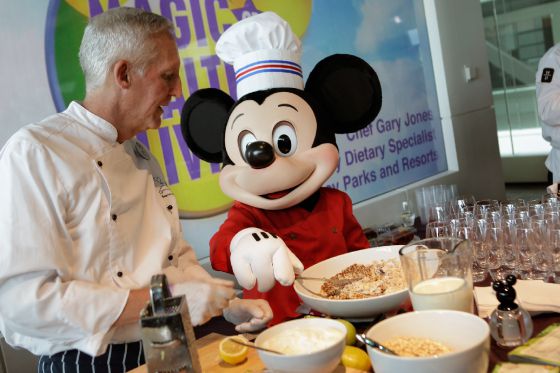
There is no one better than Mickey Mouse to explain to children the importance of maintaining a healthy diet. In an almost unprecedented decision, The Walt Disney Company, an American company that owns more than ten TV channels (many of which are for children), has decided to eliminate ad spaces for greasy, high-calorie food aimed at children under the age of 12 in the United States. The measure will come into effect in 2015.
Mickey Mouse and Ronald McDonald have not always had such a problematic relationship. Exactly a decade ago, the Disney Channel and the fast-food chain McDonald’s signed a $3 million agreement, in which it was established that McDonald’s would sponsor “Playhouse Disney,” a TV show for preschoolers, with 15-second ads. The Disney Channel, a pay-cable channel, started operating without advertising interruption.
Disney has now introduced a new summary of nutrition guidelines that applies to all its channels. Advertisements for food that is over 600 calories will be filtered, as well as those products containing more than 2.5 grams of sugar per 100 calories or those containing trans fats. The so-called “Happy Meal” (which consists of a hamburger, french fries and a soft drink) will not be advertised during children’s TV shows because, according to McDonald’s information, it contains one gram of trans fat.
Disney, valued at $41 million, is not only the owner of homonymous channels for teenagers and children, but also mainstream networks such as ABC, which includes ABC News and ESPN. This measure will also apply to its radio and Web pages. Disney managers have also announced parallel measures in order to sell healthier food (like fruit and vegetables) in their theme parks.
During the launch of these new healthy eating guidelines, Disney has allied with First Lady Michelle Obama, who has turned healthy eating into her personal cause. “With the new initiative, Disney is doing what no major media company has ever done before in the U.S. – and what I hope every company will do going forward,” said Obama, during Disney’s Magic of Healthy Living press conference. Disney CEO Robert Iger added, “The emotional connection kids have to our characters and stories gives us a unique opportunity to continue to inspire and encourage them to lead healthier lives.”
The question is now whether Winnie the Pooh will stop consuming those large honey jars. It would set a good example for children in the U.S. According to the U.S. federal government statistics, one-third of them are overweight and 17 percent are obese. According to recent studies, children between the ages of eight and 18 spend an average of 4.5 hours per day watching television. Those even younger, between the ages of six months and six years, spend almost two hours in front of TV screens.
In 2006, Disney had already given signs that it was looking to distance itself from fast food. The release of the movies “Cars” and “Pirates of the Caribbean: Dead Man’s Chest” ended the commercial agreement under which it had to sponsor the boxes and toys of Happy Meals, which remain very popular among children. That decision — and its current consequences — were attributed to the late Steve Jobs, Apple’s co-founder, who was then majority stockholder as well as Disney’s CEO, after it acquired Pixar, a company he had also created.

Leave a Reply
You must be logged in to post a comment.